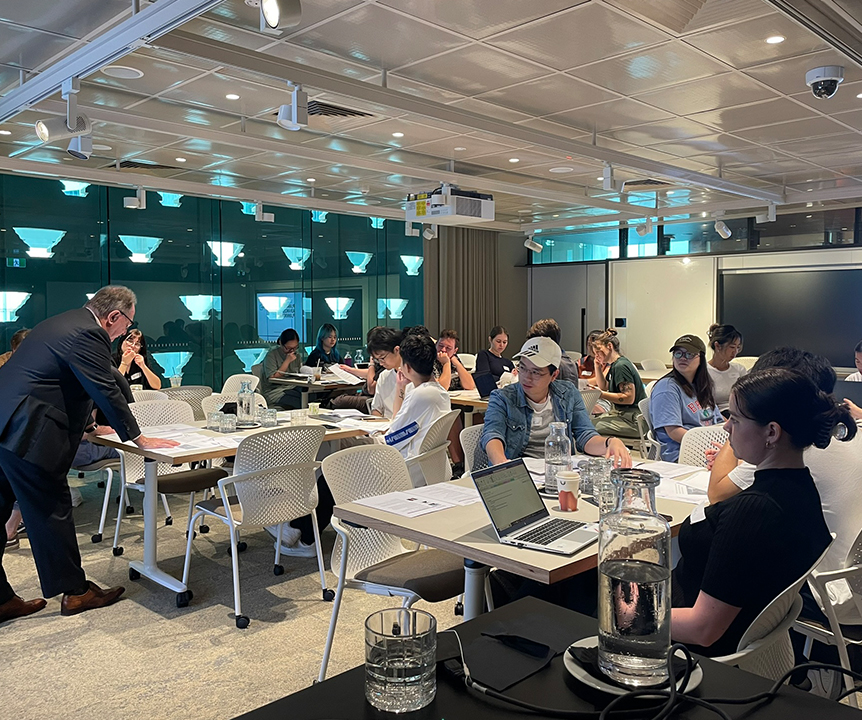As the next generation of regional and town planning professionals face unprecedented tasks at local and global scales, the relationship between industry and tertiary education has never been more crucial.
At The University of Queensland’s (UQ) School of Architecture, Design and Planning (ADP), deep and broad connections to industry through curriculum development, mentoring and employability strategies are preparing students to confidently address the complex needs of our evolving world.
Peter Hyland, Industry Fellow in the School, says students whose education experience is supported by industry involvement have the valuable opportunity to enrich their knowledge and skill development with insights that help them to create transformative solutions to pressing urban, regional and global challenges.
“By involving industry in planning education, we can help to ensure our students are exposed to the real-world trends and challenges that the profession is facing, such as climate change, the housing shortage and the impact of artificial intelligence,” Mr Hyland said.
As an Industry Fellow, Mr Hyland contributes to teaching in the School and fosters relations with industry, government, professional bodies, and the wider community. He balances this part-time role with a part-time consultancy as a Director of Client Engagement and Business Development at Urbis, where 24 years ago he was a founding director in Queensland. He also sits on the Advisory Panel of Economic Development Queensland, and the Queensland Urban Design and Places Panel.
“The mix of activities provides great insights and currency that I can bring to all of my roles,” Mr Hyland said.

Also bringing industry experience to coursework, teaching and research is Stephanie Wyeth, the School’s Professional Planner in Residence. Ms Wyeth is one of Queensland’s leading social planners, with more than 20 years of experience across government, NGO, academic and private sectors.
As a “pracademic,” she seeks to promote the exchange of knowledge, ideas and capabilities across university, industry and community. She designs and teaches planning courses, organises field trips and other real-world experiences, engages with industry leaders and hosts events. She works closely with academic researchers, course coordinators and employability teams.
“A core capability of the Professional Planner in Residence is being a “critical friend” to researchers and engaging collaboratively to consider how research could be applied in the community” Ms Wyeth said.
Ms Wyeth’s understanding of policy and decision-making processes, along with her experience in weighing-up sometimes competing interests and values, means she can also provide pragmatic advice on challenges, risks and opportunities that may result from project planning or research findings.

Another important aspect is industry contribution to curriculum development, which is supported by a UQ Industry Advisory Board that helps to ensure the courses consider contemporary issues and challenges and are relevant to future industry needs.
In addition, industry professionals, community advocates and other specialists are regularly engaged in coursework at all year levels, delivering lectures, participating in workshops, panel discussion and crits on project work, and providing career advice for up-and-coming planners and city-shapers.
“The industry professionals we engage are passionate about young people and the need to build a diverse, engaged and inclusive workforce for the future,” Ms Wyeth said.
Courses developed in collaboration with industry partners often include experiences of real planning issues on site, inspiring students to think outside the box about matters that impact their community.


In the first year of a Bachelor of Regional and Town Planning, PLAN1000 – The Planning Challenge students attend a three-day fieldtrip to a rural location in South East Queensland. They meet with local government staff, technical specialists and community members to explore and analyse issues important to that community. Students collect data from the field and design a project to address a local social or environmental challenge.

In the fourth year of the program, PLAN4100 – Advanced Planning Practice students prepare a detailed technical planning report on an innovative development scheme on a real site. Parts of the course are co-taught with planning professionals who provide insights in current policy, political and practice issues that impact the day-to-day life of a working planner. Students also have the opportunity to develop skills in working with other disciplines such as architects, engineers and ecologists, demystifying what work looks like for graduates.
Ms Wyeth says one of the key benefits of her industry-focused role in the School is that she can share her experience in establishing, leading and managing teams in project-based environments. This understanding of what different organisations and employers are looking for in student interns or graduate positions is invaluable to employability outcomes.
Similarly, Mr Hyland says industry-informed education “ensures industry is confident that our graduates have had the appropriate training to be productive employees.” He says industry professionals also help to shape the future careers of planning students through mentoring.
“Importantly, this mentoring can be effective across the spectrum of industry professionals, from recent graduates early in their career, to established industry experts with many years of experience,” Mr Hyland said.
The School also supports organisations such as the UQ Organisation of Planning Students (OOPS) and Queensland Young Planners, whose members can access a range of professional development and networking opportunities.
This collaborative approach between industry and education not only enriches the learning experience but also strengthens the profession, fostering a new generation of planners who are inspired and prepared to lead the industry into the future.



